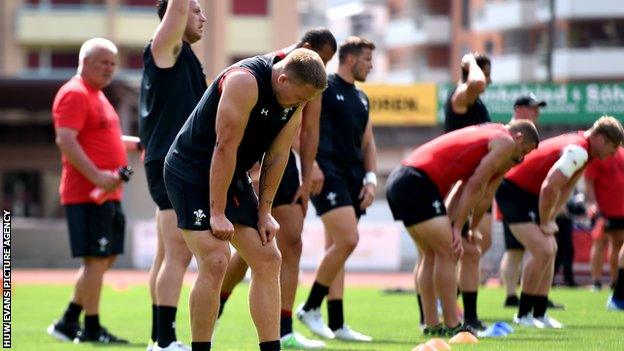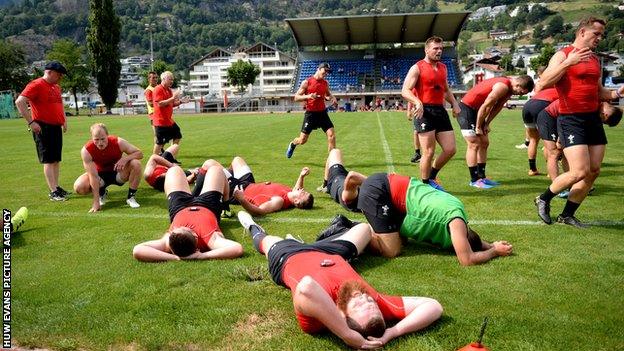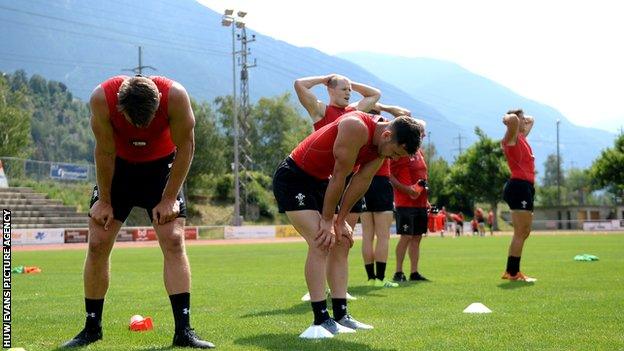Inside Wales' gruelling World Cup altitude training camp
- Published
Hadleigh Parkes: Wales' Alps training camp living up to 'hell' billing
There is still a dusting of snow on the mountain tops but the heat is roasting at the foot of the Swiss Alps, where Wales' rugby players are being punished in a circuit class like no other.
Ken Owens and his fellow front-rowers take turns to wrestle, captain Alun Wyn Jones pounds away at an exercise bike like he's at the Tour de France, while Taulupe Faletau flips a tyre twice his size with the help of Aaron Shingler.
Chests heaving, sweat pouring from their tanned brows, the players graft relentlessly as dance music drowns out the cowbells and streams which usually accompany this rarefied air.
Fiesch is a quaint little Alpine village with a population of less than 1,000, and its altitude has brought Wales here for a two-week training camp as they prepare for the Rugby World Cup, which starts in two months.
Their mantra is 'Live high, train low', with the squad based 2,300m above sea level and training 1,000m lower. Even at their lowest, the players are training at the equivalent height of Snowdon's summit.
Huw Bennett is a former Wales hooker who is now a strength and conditioning coach, and he is in his element as he barks orders during this circuit class, one of the many brutal workouts he has created for the players.
"We have sessions devised to put them in that dark place," he says with a gleeful glint.
"We don't put them in that hole every session but we'll give them little blasts, little hits.

Wales have reached 14 games unbeaten and won the 2019 Six Nations via a Grand Slam campaign
"Physically we've got the benefits of living at altitude and we train at an altitude which doesn't affect the intensity of our sessions."
Wales were here four years ago in the build-up to the previous World Cup and, of the extended 42-man squad in Fiesch this time, 18 were subjected to this torment in 2015.
"A few of the bigger blokes could lose a bit of fat up here. With the altitude, you burn more calories so it's a bonus," says prop Tomas Francis, on his second visit here.
"The new guys have been flying in. They've been training like dragons, flat-out, on it."
One of those experiencing the ordeal for the first time is centre Hadleigh Parkes, one of Wales' Six Nations Grand Slam winners earlier this year but a rookie as far as Fiesch is concerned.
The 31-year-old was told by veterans of the previous Swiss expedition to expect a hellish workload, so has it lived up to its billing?
"It certainly has," Parkes grins.
"There have been a fair few very tough sessions but there's a pretty big carrot at the end of it, so you just put your head down and get stuck into it.
"It's a close-knit group and everyone's getting on well and you pull each other through."
The carrot Parkes mentions, of course, is the World Cup.
Head coach Warren Gatland will cut this 42-man squad down to a final 31 to take to Japan in September, and the New Zealander is keeping a close eye on everyone in Switzerland.
Over the course of a day's various training sessions, Gatland spends time with different groups, at some points overseeing lineouts and ruck-clearing exercises with the forwards, and at others picking up a tackle bag and forming part of a defensive line as the backs go through their set plays.
If a player is going to represent Wales at a World Cup, Gatland wants to know every little detail about them. With the tackle bag on his arm and a watchful glare, he can see into the whites of their eyes as they come running towards him.

Wales reached the quarter finals in the last World Cup at the expense of England, but they were eliminated by South Africa
His trusted lieutenants are hard at work too. Attack coach Rob Howley loudly encourages and demands better from the backs, skills coach Neil Jenkins likewise with the kickers, while forwards coach Robin McBryde - wearing a fetching sun hat - marshals the pack.
The training pitch is a hive of noisy activity, with players gasping and sometimes retching as they switch from game-specific skill drills to weight sessions and endurance tests designed to prepare them for the potentially exhausting humidity of Japan.
Swiss temperatures close to 30 degrees are also helping with that acclimatisation, and that searing heat has prompted the likes of centre Jonathan Davies and wing Steff Evans to shave their heads.
Faletau, meanwhile, has opted for blonde highlights, and his mode of sun protection is to wear a visor while he trains.
The abiding vibe of these sessions is the intensity. Players are in the kind of peak physical condition which could get them on the cover of Men's Health magazine, and their commitment to this World Cup campaign is all-consuming.
It is simply not feasible to work for 24 hours, though. After toiling all day, the players do have some time to unwind.
"It's pretty beautiful," Parkes says, turning to look at the imposing, snow-flecked Alps which form an awe-inspiring backdrop to the team hotel.
"You do get to wake up and look out on your deck at some beautiful sights, but there's some hard work so you only get to enjoy it for a little bit."
The players make the most of the little downtime they have, playing cards, going out for a coffee or, in Bradley Davies' case, organising a quiz night.
This is clearly a happy group of players, in supreme form on the field and comfortable in each other's company off it.
On one of their daily journeys on the cable car down to training, Alun Wyn Jones and Jonathan Davies giggle in the corner as they use a speaker to play the classic Dafydd Iwan song 'Yma o Hyd' - a Scarlets anthem - to tease the region's captain and Wales hooker, Ken Owens, who tries not to bite on the bait as he grimaces in the carriage packed with tourists.
For a group of men about to be put through the wringer once more, they seem remarkably relaxed.
But as soon as the whistle blows, that impenetrable focus returns.
"There's a mantra with Gatland: 'Work harder than others.' The guys have got to apply that and there's got to be that buy-in," says Bennett.
"A lot of success has come off the back of it and the guys know if they put the work in they'll get the rewards.

Wales will be coached by former Scarlets head coach Wayne Pivac after the World Cup as Warren Gatland is standing down
"If they cut corners - as little as 10cm off the line or not finishing that last rep - they know mentally they're not in the right place.
"It's not the case that our conditioning is done because we're still very early in our preparations for Japan. A bulk of our conditioning is done but we don't want the boys thinking it's finished."
When you spend time with this squad, you get the distinct impression that there is no danger of any players cutting corners or thinking the hard work is done.
That will only be finished once they have the World Cup in their hands.